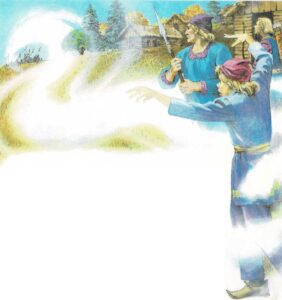Stories
The Boy Who Became a Wizard
from A Wizard of Earthsea by Ursula K. Le Guin
Earthsea is an imaginary world made up entirely of islands. On one of
these, the island of Gont, lives the boy Duny. Duny longs to be a mage,
or wizard, and he already has some magical powers. Now his magic is
about to be put to the test. The savage Kargs, from the Kargad Empire
which lies to the west, have sailed to invade Gont.
In those days the Kargad Empire was strong. Those are four great lands
that lie between the Northern and the Eastern Reaches: Karego-At, Atuan,
Hur-at-Hur,
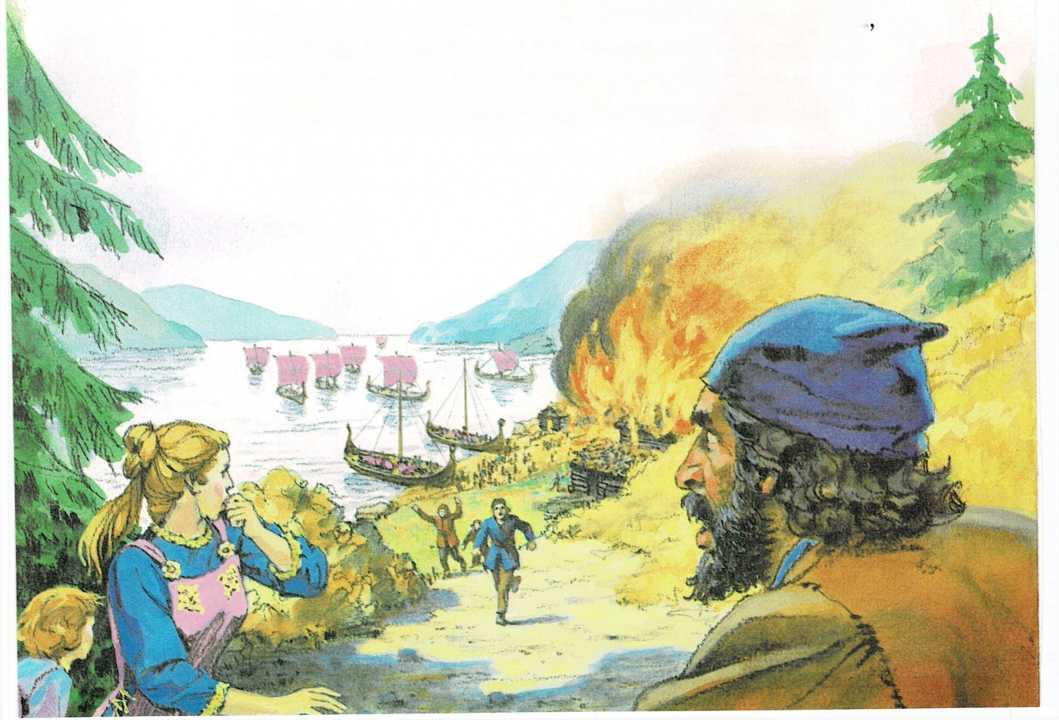
Atnini. The tongue they speak there is not like any
spoken in the Archipelago or the other Reaches, and
they are a savage people, white-skinned, yellow-haired and fierce,
liking the sight of blood and the smell of burning towns. Last year
they had attacked the Torikles and the strong island Torheven, raiding
in
great force in fleets of red-sailed ships. News of this came north to
Gont, but the Lords of Gont were busy with their piracy and paid small
heed to the woes of other lands. Then Spevy fell to the Kargs and was
looted and laid waste, its people taken as slaves, so that even now it
is an isle of ruins. In lust of conquest the Kargs sailed next to Gont,
coming in a host, thirty great long ships, to East Port. They fought
through that town, took it, burned it; leaving their ships under guard
at the mouth of the River Ar they went up the Vale wrecking and looting,
slaughtering cattle and men. As they went they split into bands, and
each of these bands plundered where it chose. Fugitives brought warning
to the villages of the heights. Soon the people of Ten Alders saw smoke
darken the eastern sky, and that night those who climbed the High Fall
looked down on the Vale all hazed and red-streaked with fires where
fields ready for harvest had been set ablaze, and orchards burned, the
fruit roasting on the blazing boughs, and barns and farmhouses
smouldered in ruin.
Some of the villagers fled up the ravines and hid in the forest, and
some made ready to fight for their lives, and some did neither but stood
about lamenting. The witch was one who fled, hiding alone in a cave up
on the Kapperding Scarp and sealing the cave-mouth with spells. Duny’s
father the bronzesmith was one who stayed, for he would not leave his
smelting-pit and forge where he had worked for fifty years. All that
night he labored beating up what ready metal he had there into
spearpoints, and others worked with him binding these to the handles of
hoes and rakes, there being no time to make sockets and shaft them
properly. There had been no weapons in the village but hunting bows and
short knives, for the mountain folk of Gont are not warlike; it is not
warriors they are famous for, but goat-thieves, sea-pirates, and
wizards.
With sunrise came a thick white fog, as on many autumn mornings in the
heights of the island. Among their huts and houses down the straggling
street of Ten Alders the villagers stood waiting with their hunting bows
and new-forged spears, not knowing whether the Kargs might be far off or
very near, all silent, all peering into the fog that hid shapes and
distances and dangers from their eyes.
With them was Duny. He had worked all night at the forge-bellows,
pushing and pulling the two long sleeves of goathide that fed the fire
with a blast of air. Now his arms so ached and trembled from that work
that he could not hold out the spear he had chosen. He did not see how
he could fight or be of any good to himself or the villagers. It rankled
at his heart that he should die, spitted on a Kargish lance, while still
a boy: that he should go into the dark land without ever having known
his own name, his true name as a man. He looked down at his thin arms,
wet with cold fog-dew, and raged at his weakness, for he knew his
strength. There was power in him, if he knew how to use it, and he
sought among all the spells he knew for some device that might give him
and his companions an advantage, or at least a chance. But need alone is
not enough to set power free: there must be knowledge.
The fog was thinning now under the heat of the sun that shone bare above
on the peak in a bright sky. As the mists moved and parted in great
drifts and smoky wisps, the villagers saw a band of warriors coming up
the mountain. They were armored with bronze helmets and greaves and
breastplates of heavy leather and shields of wood and bronze, and armed
with swords and the long Kargish lance. Winding up along the steep bank
of the Ar they came in a plumed, clanking, straggling line, near enough
already that their white faces could be seen, and the words of their
jargon heard as they shouted to one another. In this band of the
invading horde there were about a hundred men, which is not many; but in
the village were only eighteen men and boys.
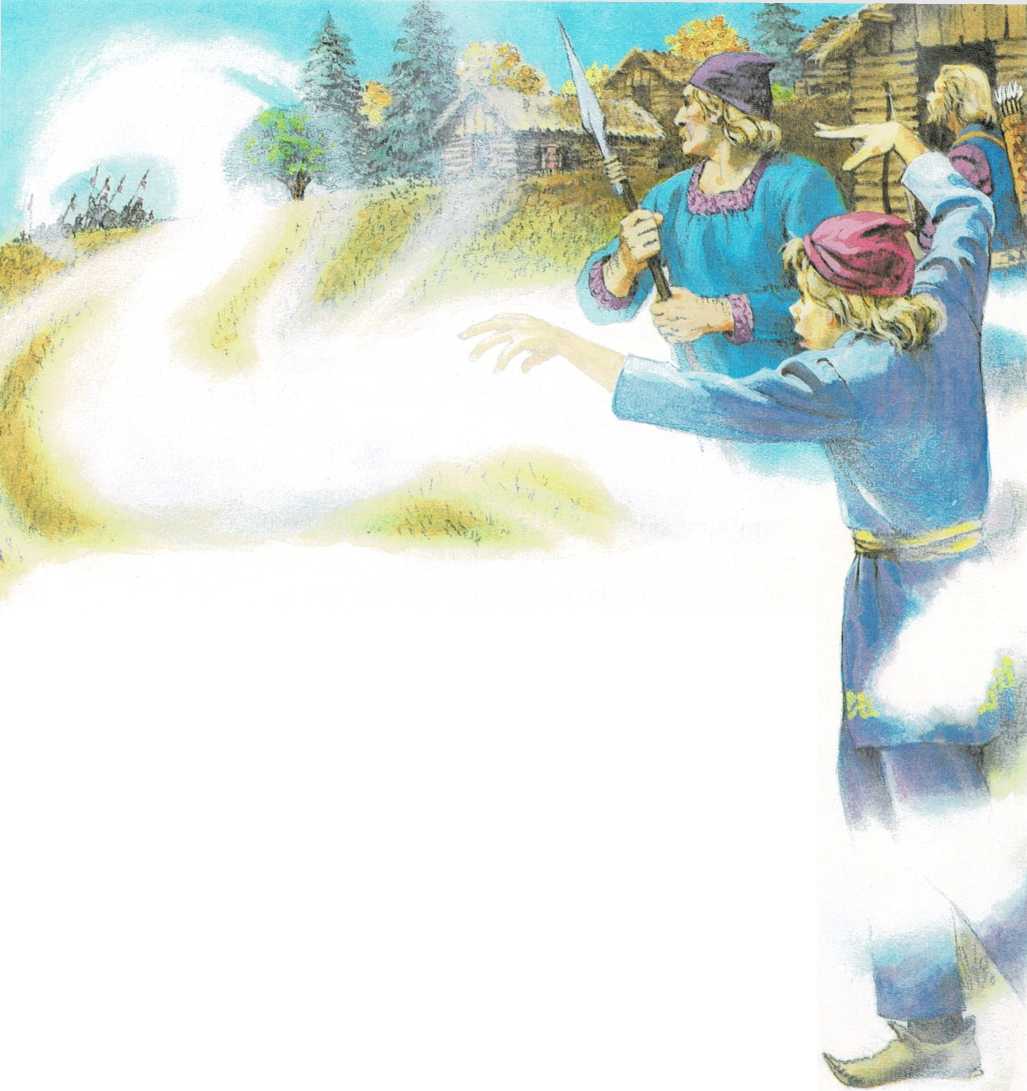
Now need called knowledge out: Duny, seeing the fog blow and thin across
the path before the Kargs, saw a spell that might avail him. An old
weatherworker of the Vale, seeking to win the boy as prentice, had
taught him several charms. One of these tricks was called fogweaving, a
binding-spell that gathers the mists together for a while in one place;
with it one skilled in illusion can shape the mist into fair ghostly
seemings, which last a little and fade away. The boy had no such skill,
but his intent was different, and he had the strength to turn the spell
into his own ends. Rapidly and aloud he named the places of the
boundaries of the village, and then spoke the fogweaving charm, but in
among its words he enlaced the words of a spell of concealment, and last
he cried the word that set the magic going.
Even as he did so his father coming up behind him struck him hard on the
side of the head, knocking him right down. “Be still, fool! keep your
blattering mouth shut, and hide if you can’t fight!”
Duny got to his feet. He could hear the Kargs now at the end of the
village, as near as the great yew tree
by the tanner’s yard. Their voices were clear, and the clink and creak
of their harness and arms, but they could not be seen. The fog had
closed and thickened all over the village, greying the light, blurring
the world till a man could hardly see his own hands before him.
“I’ve hidden us all,” Duny said, sullenly, for his head hurt from his
father’s blow, and the working of the doubled incantation had drained
his strength. “I’ll keep up this fog as long as I can. Get the others to
lead them up the High Fall.”
The smith stared at his son who stood wraithlike in that weird, dank
mist. It took him a minute to see Duny’s meaning, but when he did he ran
at once, noiselessly, knowing every fence and corner of the village, to
find the others and tell them what to do. Now through the grey fog
bloomed a blur of red, and the Kargs set fire to the thatch of a house.
Still they

did not come up into the village, but waited at the lower end till the
mist should lift and lay bare their loot and prey.
The tanner, whose house it was that burned, sent a couple of boys
skipping right under the Kargs’ noses, taunting and yelling and
vanishing again like smoke into smoke. Meantime the older men, creeping
behind fences and running from house to house, came close on the other
side and sent a volley of arrows and spears at the warriors, who stood
all in a bunch. One Karg fell writhing with a spear, still warm from its
forging, right through his body. Others were arrow-bitten, and all
enraged. They charged forward then to hew down their puny attackers, but
they found only the fog about them, full of voices. They followed the
voices, stabbing ahead into the mist with their great, plumed,
bloodstained lances. Up the length of the street they
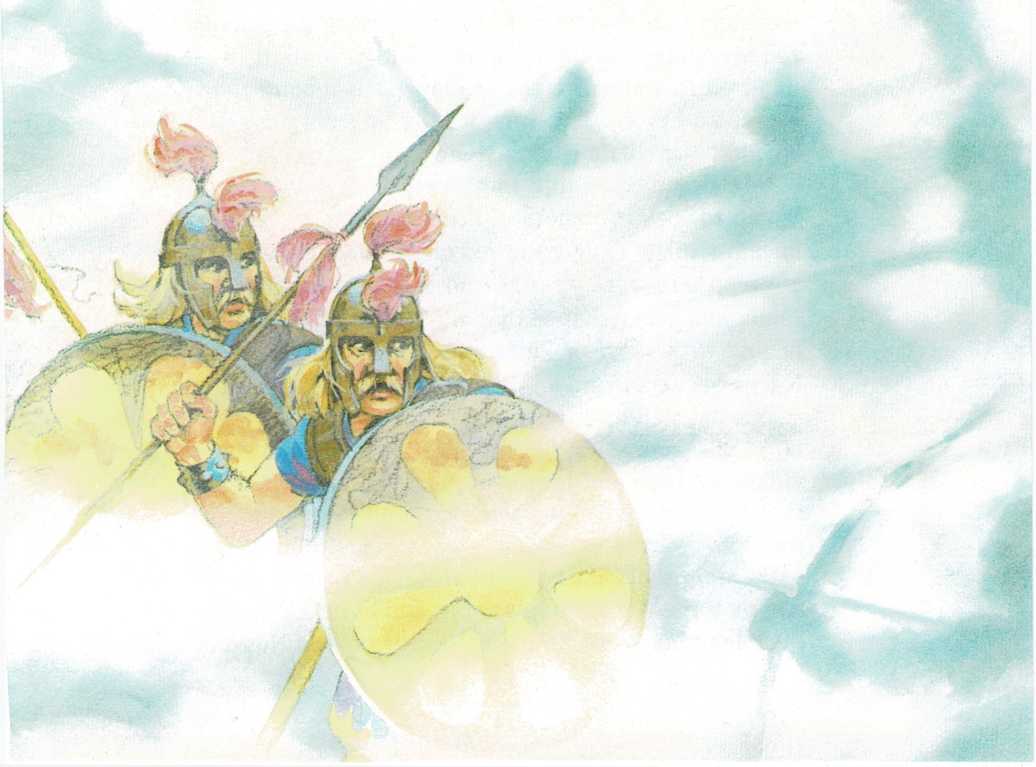
came shouting, and never knew they had run right through the village, as
the empty huts and houses loomed and disappeared again in the writhing
grey fog. The villagers ran scattering, most of them keeping well ahead
since they knew the ground; but some, boys or old men, were slow. The
Kargs stumbling on them drove their lances or hacked with their swords,
yelling their war cry, the names of the White Godbrothers of Atuan:
“Wuluah! Atwah!”
Some of the band stopped when they felt the land grow rough underfoot,
but others pressed right on, seeking the phantom village, following dim
wavering shapes that fled just out of reach before them. All the mist
had come alive with these fleeing forms, dodging, flickering, fading on
every side. One group of the Kargs chased the wraiths straight to the
High Fall, the cliff’s edge above the springs of Ar, and the shapes they
pursued ran out onto the air and there vanished in a thinning of the
mist, while the pursuers fell screaming through fog and sudden sunlight
a hundred feet sheer to the shallow pools among the rocks. And those
that came behind and did not fall stood at the cliff’s edge, listening.
Now dread came into the Kargs’ hearts and they began to seek one
another, not the villagers, in the uncanny mist. They gathered on the
hillside, and yet always there were wraiths and ghost-shapes among them,
and other shapes that ran and stabbed from behind with spear or knife
and vanished again. The Kargs began to run, all of them, downhill,
stumbling, silent, until all at once they ran out from the grey blind
mist and saw the river and the ravines below the village all bare and
bright in morning sunlight. Then they stopped, gathering together, and
looked back. A wall of wavering, writhing grey lay blank across the
path, hiding all that lay behind it. Out from it burst two or three
stragglers, lunging and stumbling along, their long lances rocking on
their shoulders. Not one
Karg looked back more than that once. All went down, in haste, away from
the enchanted place.
Farther down the Northward Vale those warriors got their fill of
fighting. The towns of the East Forest, from Ovark to the coast, had
gathered their men and sent them against the invaders of Gont. Band
after band they came down from the hills, and that day and the next the
Kargs were harried back down to the beaches above East Port, where they
found their ships burnt; so they fought with their backs to the sea till
every man of them was killed, and the sands of Armouth were brown with
blood until the tide came in.
But on that morning in Ten Alders village and up on the High Fall, the
dank grey fog had clung a while, and then suddenly it blew and drifted
and melted away. This man and that stood up in the windy brightness of
the morning, and looked about him wondering. Here lay a dead Karg with
yellow hair long, loose, and bloody; there lay the village tanner,
killed in battle like a king.
Down in the village the house that had been set afire still blazed. They
ran to put the fire out, since their battle had been won. In the street,
near the great yew, they found Duny the bronzesmith’s son standing by
himself, bearing no hurt, but speechless and stupid like one stunned.
They were well aware of what he had done, and they led him into his
father’s house and went calling for the witch to come down out of her
cave and heal the lad who had saved their lives and their property, all
but four who were killed by the Kargs, and the one house that was burnt.
No weapon-hurt had come to the boy, but he would not speak nor eat nor
sleep; he seemed not to hear what was said to him, not to see those who
came to see him. There was none in those parts wizard enough to cure
what ailed him. His aunt said, “He has overspent his power,” but she had
no art to help him.
While he lay thus dark and dumb, the story of the lad who wove the fog
and scared off Kargish swordsmen with a mess of shadows was told all
down the Northward Vale, and in the East Forest, and high on the
mountain and over the mountain even in the Great Port of Gont. So it
happened that on the fifth day after the slaughter at Armouth a stranger
came into Ten Alders village, a man neither young nor old, who came
cloaked and bareheaded, lightly carrying a great staff of-oak that was
as tall as himself. He did not come up the course of the Ar like most
people, but down, out of the forests of the higher mountainside. The
village goodwives saw well that he was a wizard, and when he told them
that he was a heal-all, they brought him straight to the smith’s house.
Sending away all but the boy’s father and aunt the stranger stooped
above the cot where Duny lay staring into the dark, and did no more than
lay his hand on the boy’s forehead and touch his lips once.
Duny sat up slowly looking about him. In a little while he spoke, and
strength and hunger began to come back into him. They gave him a little
to drink and eat, and he lay back again, always watching the stranger
with dark wondering eyes.
The bronzesmith said to that stranger, “You are no common man.”
“Nor will this boy be a common man,” the other answered. “The tale of
his deed with the fog has come to Re Albi, which is my home. I have come
here to give him his name, if as they say he has not yet made his
passage into manhood.”
The witch whispered to the smith, “Brother, this must surely be the Mage
of Re Albi, Ogion the Silent, that one who tamed the earthquake—“
“Sir,” said the bronzesmith who would not let a great name daunt him,
“my son will be thirteen this month coming, but we thought to hold his
Passage at the feast of Sun-return this winter.”
“Let him be named as soon as may be,” said the mage, “for he needs his
name. I have other business now, but I will come back here for the day
you choose. If you see fit I will take him with me when I go thereafter.
And if he prove apt I will keep him as prentice, or see to it that he is
schooled as fits his gifts. For to keep dark the mind of the mageborn,
that is a dangerous thing.”
Very gently Ogion spoke, but with certainty, and even the hard-headed
smith assented to all he said.
On the day the boy was thirteen years old, a day in the early splendor
of autumn while still the bright leaves are on the trees, Ogion returned
to the village from his rovings over Gont Mountain, and the ceremony of
Passage was held. The witch took from the boy his name Duny, the name
his mother had given him as a baby. Nameless and naked he walked into
the cold springs of the Ar where it rises among rocks under the high
cliffs. As he entered the water clouds crossed the sun’s face and great
shadows slid and mingled over the water of the pool about him. He
crossed to the far bank, shuddering with cold but walking slow and erect
as he should through that icy, living water. As he came to the bank
Ogion, waiting, reached out his hand and clasping the boy’s arm
whispered to him his true name: Ged.
Thus was he given his name by one very wise in the uses of power.
The feasting was far from over, and all the villagers were making merry
with plenty to eat and beer to drink and a chanter from down the Vale
singing the Deed of the Dragonlords, when the mage spoke in his quiet
voice to Ged: “Come, lad. Bid your people farewell and leave them
feasting.”
Ged fetched what he had to carry, which was the good bronze knife his
father had forged him, and a leather coat the tanner’s widow had cut
down to his size, and an alderstick his aunt had becharmed for him:

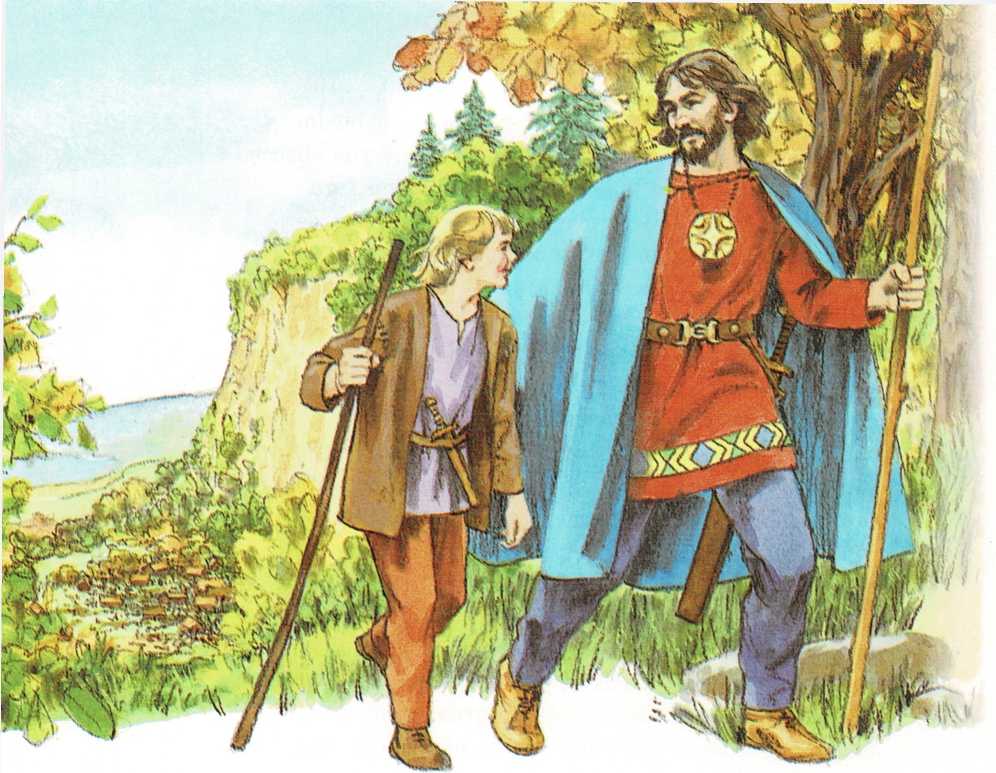
that was all he owned besides his shirt and breeches. He said farewell
to them, all the people he knew in all the world, and looked about once
at the village that straggled and huddled there under the cliffs, over
the river-springs. Then he set off with his new master through the steep
slanting forests of the mountain isle, through the leaves and shadows of
bright autumn.
In the book, The Wizard of Earthsea, you can follow Ged to the School
for Wizards. You will also see what happens when, driven by pride and
jealousy, he uses his power too soon and unleashes a shadowy evil that
threatens all of Earthsea. The author, Ursula K. Le Guin, has written
two other books about the adventures of Ged that you will want to read:
Tombs of Atuan and *The Farthest Shore.

